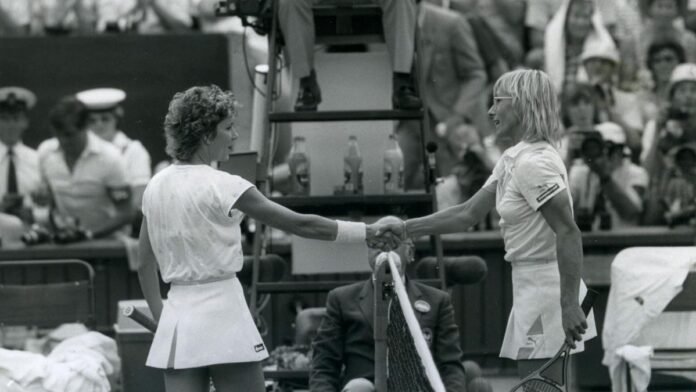Martina Navratilova, Chris Evert, and other prominent figures in tennis are speaking out against Saudi Arabia’s increasing influence in the sport. The recent announcement by the Women’s Tennis Association (WTA) that the year-end Finals event will be held in Saudi Arabia from 2024 has sparked controversy. Riyadh will also host the ‘NextGen’ ATP Finals, a significant tournament for young men’s players.
Navratilova and Evert, along with other players and officials, express concerns about the decision to hold major tennis events in Saudi Arabia. They highlight the country’s human rights record and its treatment of women as areas of particular concern. The move to host prestigious tournaments in Saudi Arabia raises ethical questions about the sport’s alignment with values of equality and inclusivity.
The decision by the WTA and ATP to partner with Saudi Arabia has drawn criticism from various quarters. Critics argue that by hosting events in the kingdom, tennis risks legitimizing and whitewashing the Saudi government’s actions. They call for greater scrutiny and accountability in the selection of host countries for major tournaments.
Navratilova and Evert, both former world number ones and champions, are using their platform to raise awareness about the implications of hosting tennis events in Saudi Arabia. They emphasize the importance of upholding values of integrity and fairness in the sport. Their advocacy highlights the need for tennis governing bodies to consider broader ethical considerations when making decisions about tournament locations.
The controversy surrounding the decision to hold tennis events in Saudi Arabia reflects broader debates about the role of sports in geopolitics. As global sporting events become increasingly lucrative, questions arise about the extent to which financial interests outweigh ethical concerns. Navratilova, Evert, and others are calling for greater transparency and accountability in the sport’s governance.
Despite the pushback, the WTA and ATP remain committed to their partnerships with Saudi Arabia. The allure of lucrative deals and expanding the sport’s reach into new markets may outweigh concerns about human rights and political considerations. However, the voices of dissent from tennis legends like Navratilova and Evert serve as a reminder of the importance of upholding principles of justice and equality in sports.
Martina Navratilova, Chris Evert, and other prominent figures in tennis are speaking out against Saudi Arabia’s increasing influence in the sport. The recent announcement by the Women’s Tennis Association (WTA) that the year-end Finals event will be held in Saudi Arabia from 2024 has sparked controversy. Riyadh will also host the ‘NextGen’ ATP Finals, a significant tournament for young men’s players.
Navratilova and Evert, along with other players and officials, express concerns about the decision to hold major tennis events in Saudi Arabia. They highlight the country’s human rights record and its treatment of women as areas of particular concern. The move to host prestigious tournaments in Saudi Arabia raises ethical questions about the sport’s alignment with values of equality and inclusivity.
The decision by the WTA and ATP to partner with Saudi Arabia has drawn criticism from various quarters. Critics argue that by hosting events in the kingdom, tennis risks legitimizing and whitewashing the Saudi government’s actions. They call for greater scrutiny and accountability in the selection of host countries for major tournaments.
Navratilova and Evert, both former world number ones and champions, are using their platform to raise awareness about the implications of hosting tennis events in Saudi Arabia. They emphasize the importance of upholding values of integrity and fairness in the sport. Their advocacy highlights the need for tennis governing bodies to consider broader ethical considerations when making decisions about tournament locations.
The controversy surrounding the decision to hold tennis events in Saudi Arabia reflects broader debates about the role of sports in geopolitics. As global sporting events become increasingly lucrative, questions arise about the extent to which financial interests outweigh ethical concerns. Navratilova, Evert, and others are calling for greater transparency and accountability in the sport’s governance.
Despite the pushback, the WTA and ATP remain committed to their partnerships with Saudi Arabia. The allure of lucrative deals and expanding the sport’s reach into new markets may outweigh concerns about human rights and political considerations. However, the voices of dissent from tennis legends like Navratilova and Evert serve as a reminder of the importance of upholding principles of justice and equality in sports.
The controversy over hosting tennis events in Saudi Arabia is not limited to concerns about human rights. There are also practical considerations, such as safety and security for players and spectators. Saudi Arabia’s human rights record and political instability raise questions about the safety of hosting major sporting events in the country.
Furthermore, there are concerns about the impact of hosting major tennis tournaments in Saudi Arabia on the sport’s image and reputation. Tennis has long prided itself on promoting values of equality, fairness, and sportsmanship. Hosting events in a country with a questionable human rights record undermines these values and could tarnish the sport’s reputation.
In addition to ethical and practical concerns, there are also financial considerations at play. Saudi Arabia’s investment in sports, including tennis, is part of a broader strategy to diversify its economy and enhance its international reputation. The kingdom’s wealth and resources make it an attractive partner for sports organizations seeking to expand their reach and revenue streams.

